Lifestyle
Wicked People: Powerful Nigerian Pastor Blasts US, Speaks Out On Christian Genocide
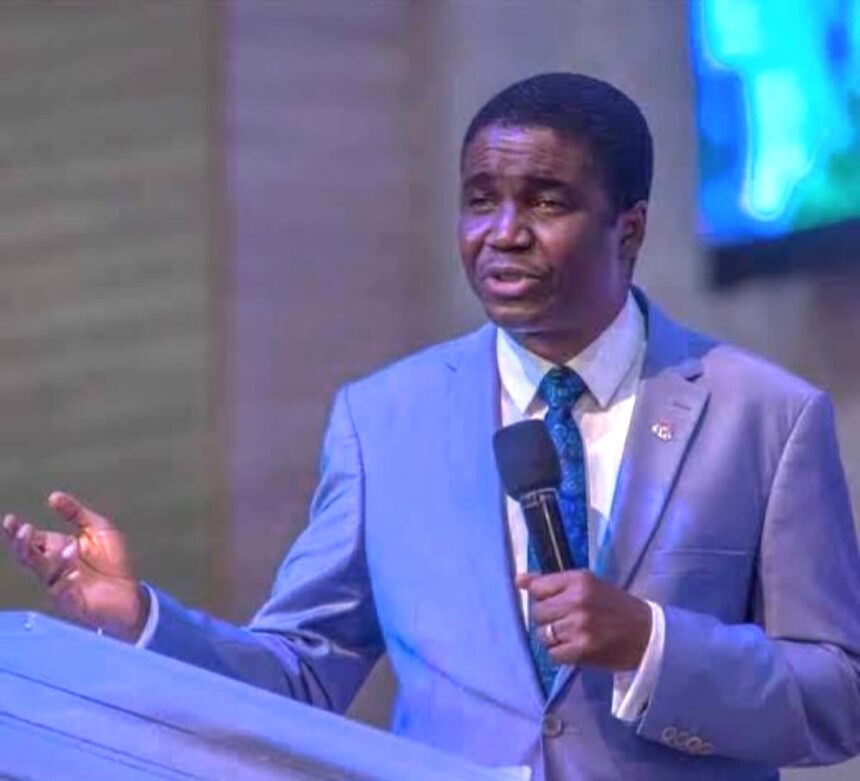
Pastor David Abioye condemned attempts to deny Christian killings in Nigeria and labelled those dismissing the crisis as wicked people
US envoy Massad Boulos dismissed genocide claims and said terrorism in Nigeria affected both Christians and Muslims
Abioye urged Christians to remain steadfast in faith despite persecution and called on God to strengthen believers.
A prominent Nigerian pastor and founder of Living Word Conquerors Global Assembly, David Abioye, has spoken out against what he described as attempts to deny the ongoing persecution and mass killings of Christians in Nigeria, describing those dismissing the crisis as “wicked people.”
The remarks come shortly after the United States Special Envoy for Arab and African Affairs, Massad Boulos, dismissed claims of an ongoing genocide against Christians in Nigeria.
Boulos, who serves as a senior adviser to former US President Donald Trump, stated during a visit to President Bola Ahmed Tinubu at the State House in Abuja on Friday, October 17, that terrorism in Nigeria affects both Christians and Muslims.
“Those people who are on the ground know that terrorism is religionless, colourless, and tribeless,” Boulos said. “People of all faiths and all nations are being killed because of terrorism. Boko Haram and ISIS have ended up killing more Muslims than Christians.” He added that many violent clashes in Nigeria’s Middle Belt are driven by competition for resources rather than religion. “It is not something that can be said to target any specific religious denomination,” he stated.
Addressing his congregation during a recent service, the pastor lamented the growing distortion surrounding reports of Christian killings in parts of the country. He accused some leaders of deliberately denying the atrocities for personal gain.
“There’s a lot of distortion going on. People are claiming there is no genocide against Christians in this nation. You see people buried in hundreds, and you say there is no genocide. What a wicked set of people!” he said passionately
He further warned that the violence, which has claimed thousands of lives in the country’s Middle Belt and northern regions, was gradually spreading southward. “This one is very clear,” he said. “Gradually, it is eating down to the South-South-West, South-East, and many so-called leaders, for their personal interest, are claiming it’s not happening. They are selling out their faith.”
The pastor, invoking the words of Jesus Christ, encouraged Christians not to lose faith in the face of persecution. “Jesus said, ‘When I come, will I find faith?’ We are standing here to say to Jesus, the faith will keep standing,” he declared. “Raise your voice and pray, Father, strengthen the brethren, strengthen the faith.”
The issue of Christian persecution in Nigeria has long been a point of contention between local religious leaders and international observers. While Christian groups maintain that their members are being deliberately targeted, some foreign officials insist that the violence is more complex and not purely religious.
Lifestyle
Watch: Trending Video Of Gen. Diya Crying, Begging Late General Sani Abacha Surfaces Online

Former Ogun State Leader, General Oladipo Diya, grovelling at General Sani Abacha’s feet, crying and begging the late Head Of State over the 1997 coup allegation.
Gen. Diya was crossed examined at the Human Rights Violation Commission (HRVIC) on the coup plan 1997 to overthrow Gen. Sanni Abacha. He bluntly denied the fact that he was part of the plan but he admitted he knew about the plan.
He further explained that he was afraid of being killed by the Coup Master Planner if he revealed the plan. He denied pleading with Gen. Sanni Abacha but was shocked to see the video where he truly knelt down before Gen. Sanni Abacha as tendered by the Lawyer.
Gen. Diya Oladipo then was appointed as Chief of Defense Staff. He was appointed Chief of General Staff in 1993 and Vice Chairman of the Provisional Ruling Council in 1994. In 1997 Diya and dissident soldiers in the military allegedly planned to overthrow the regime of Sani Abacha.
The alleged coup was uncovered by forces loyal to Abacha, and Diya and his cohorts were jailed. Diya was tried in a military tribunal and was given the death penalty. pon the untimely death of Abacha in 1998, Diya was pardoned by the late Head of State’s successor, Abdusalami Abubakar.
Below is a leaked video clip
Lifestyle
BREAKING!!! Panic As Tinubu Collapses And Fall In Turkey [VIDEO]
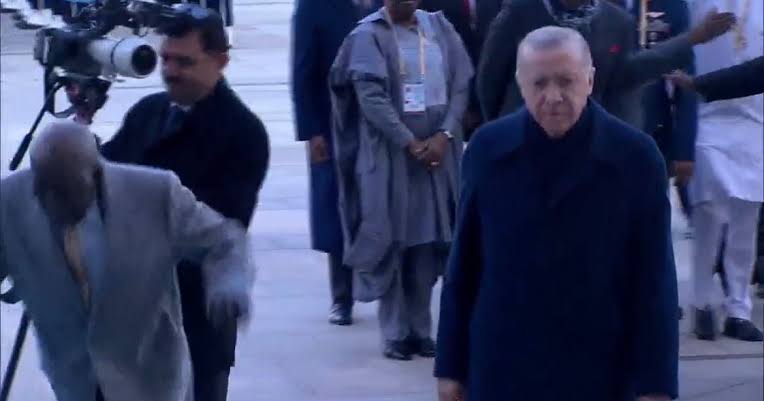
A video has emerged showing the moment President Bola Ahmed Tinubu momentarily tripped during his state visit to Turkey, according to Naija News.
Naija News reports that President Tinubu had on Monday arrived Ankara, the capital of Turkey for a state visit.
According to a statement by the Special Adviser to the President on Information and Strategy, Bayo Onanuga, the visit to Turkiye is aimed at deepening cooperation in key sectors including security, education, social development, innovation, and aviation.
Onanuga noted that the trip follows an earlier official visit to Nigeria by Turkish President Recep Tayyip Erdoğan between October 19 and 20, 2021, which reinforced diplomatic ties between Abuja and Ankara.
During President Tinubu’s visit, both countries are expected to hold strategic political and diplomatic engagements focused on shared interests in finance, communication, trade, and investment.
The programme will also feature meetings between senior government officials from both nations, alongside the signing of several memoranda of understanding (MoUs) covering scientific research, energy, technical cooperation, media and communications, military collaboration, and protocol.
A business forum will be held on the sidelines of the visit, bringing together Nigerian and Turkish investors to explore opportunities for mutual economic growth, the presidency noted.
Members of the President’s delegation participating in the bilateral engagements include the Minister of Foreign Affairs, Yusuf Tuggar; the Attorney General of the Federation and Minister of Justice, Lateef Fagbemi, SAN; the Minister of Defence, General Christopher Musa (rtd); and the Chairman of the House Committee on Defence, Jimi Benson.
Others on the entourage are the Minister of Women Affairs and Social Development, Hajiya Suleiman-Ibrahim; the Minister of Interior, Olubunmi Tunji-Ojo; the Minister of Culture and Creative Economy, Hannatu Musawa; the National Security Adviser, Malam Nuhu Ribadu; and the Director-General of the National Intelligence Agency, Mohammed Mohammed.
Culled from Naija News
Lifestyle
Makinde Kicks Off Oyo At 50 Celebration, Alaafin, Soun Absent
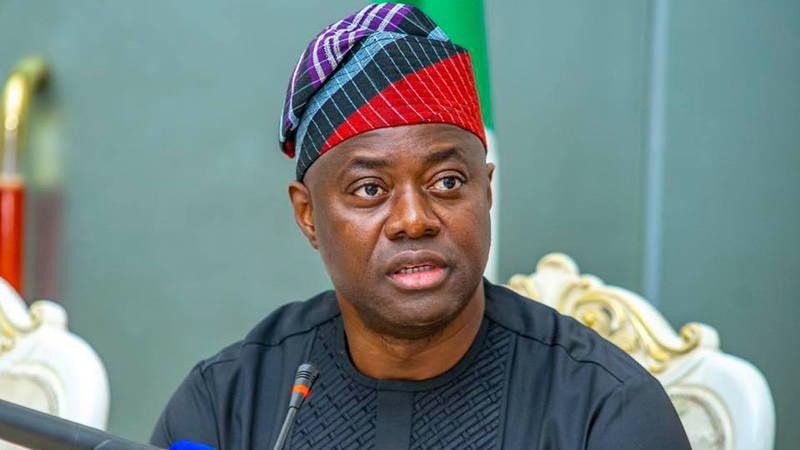
Two prominent monarchs in Oyo State, the Alaafin of Oyo, Oba Akeem Owoade, and the Soun of Ogbomoso, Oba Olaoye Ghandi, were conspicuously absent at the official flag-off of the state’s 50th anniversary celebration held on Monday.
The event, hosted at the International Conference Centre, University of Ibadan, was attended by family members of former governors, traditional rulers, political leaders, religious figures, and top government officials.
However, the empty seats reserved for the two monarchs stirred fresh reactions, especially in light of the ongoing debate over the rotational leadership of the Oyo State Council of Obas.
Governor Seyi Makinde, while recently inaugurating Olubadan of Ibadan, Oba Rashidi Ladoja, as chairman of the council, announced a new rotational structure for the leadership of the traditional council, which had previously been chaired permanently by the Alaafin.
While Makinde claimed the new arrangement had the backing of the Alaafin and Soun, the Alaafin quickly issued a rebuttal, saying he was never part of such discussions. Monday’s ceremony marked the first major state event since that controversy.
Makinde Cuts Anniversary Cake, Reflects On Legacy
Despite the absence of the two monarchs, the event proceeded with Governor Makinde delivering a keynote address and cutting the state’s golden jubilee cake.
He reiterated his administration’s focus on economic transformation, job creation, investment attraction, and inclusive development.
“The next 50 years must bring greater prosperity, fairness, dignity, and hope for all our citizens,” Makinde declared.
He paid tribute to former Governor Bola Ige, praising his focus on free education and equal opportunity, which he said shaped Oyo’s values and governance philosophy.
The governor also introduced a digital tribute platform where residents had submitted stories of opportunity, resilience, and enterprise as part of the celebration.
“These stories are not just tributes; they are evidence of opportunity, enterprise, hope, and belonging,” he said, citing one example of a youth corps member who invested his allowance in fashion design training during his NYSC year.
Earlier, the chairman of the anniversary planning committee and former House of Reps member, Saheed Fijabi, underscored the importance of the celebration as both a reflection of the past and a commitment to the future.
In his remarks, Oba Rashidi Ladoja, the Olubadan of Ibadan and new chairman of the Obas council, urged the government to remember unsung heroes and political leaders who played foundational roles in building the state. He named Chief Kolapo Ishola, Ahmed Gbadamosi, Otunba Adebayo Alao-Akala, and others whose legacies still resonate in the state’s development.
Daily voice understands that the absence of both the Alaafin and Soun, particularly during such a landmark celebration, may point to deepening tensions within the traditional council, possibly linked to Makinde’s decision to restructure its leadership
-
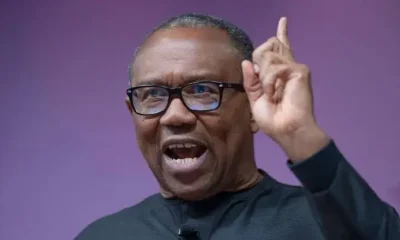
 Politics2 days ago
Politics2 days ago2027: Peter Obi Rejects Vice President Role, Declares Next Political Move
-
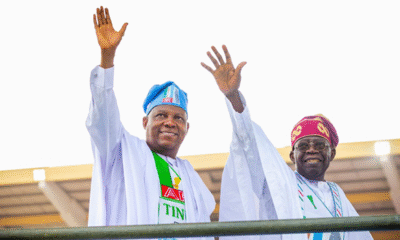
 Politics2 days ago
Politics2 days agoAPC Break Silence On Shettima’s Appointment As Vice President In 2027
-
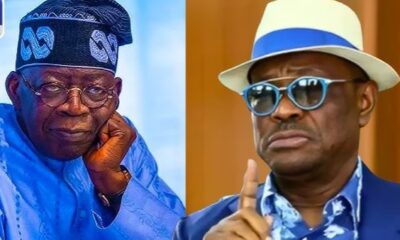
 Politics22 hours ago
Politics22 hours agoBREAKING: Tinubu Reportedly Issues Strong Orders To wike And Fubara
-

 Sports2 days ago
Sports2 days agoTransfer: Cristiano Ronaldo blocks moves for Benzema, Kante
-
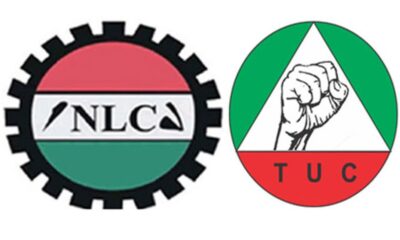
 News2 days ago
News2 days agoFCT: Court Bars NLC, TUC, Others From Embarking On Planned Protest
-

 Sports2 days ago
Sports2 days agoTransfer: Aribo seals loan move to Leicester City
-
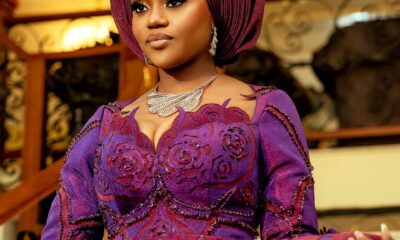
 Entertainment2 days ago
Entertainment2 days agoGrammy 2026: I am disappointed in Chioma – Delta Gov’s aide
-
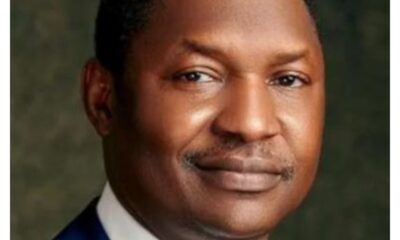
 News22 hours ago
News22 hours agoREVEALED: Details Of Alleged Terrorism Financing Charge Against Ex AGF Malami






